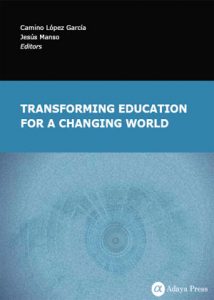1. The development of digital competence. A reflection from the point of view of addiction to ICT in education
Camino López García
Pages 1-9
|
|
|
2. Methodology of competency development and project-based learning in an environment of Smart Cities through the Internet of Things
José Manuel Soto Hidalgo, María Martínez Rojas, Juan Carlos Gámez Granados, Jesús Alcalá Fernández
Pages 10-19
|
|
|
3. Penguins in the Primary Classroom. Project-based learning through the young people’s novel A penguin in Gulpiyuri
Celia Prieto Mazariegos
Pages 20-30
|
|
|
4. Internet and social networks: a renewed projection of university education
María Dolores Ortiz Vidal
Pages 31-40 |
|
|
5. Analysis of the application of the evaluation system for the Final Degree Project of the Degree in Optics and Optometry in the Degree of Nursing. A pilot study
Verónica Velasco González, Irene Sánchez Pavón, Raúl Martín Herranz, Laura Mena García
Pages 41-50
|
|
|
6. The curricular design proposal of the Metropolitan Autonomous University: an alternative to guide the development of innovative curricula in Higher Education
David Sebastian Contreras Islas
Pages 51-60
|
|
|
7. Innovative strategies in qualitative research. Philosophy for Children as an active methodology in the classroom
Sara Mariscal Vega
Pages 61-70
|
|
|
8. Designing Augmented Reality objects: An experience with teacher education students
Sandra Martínez Pérez, Bárbara Fernández Robles, Rocío Alejandra Funes Cabrerizo
Pages 71-81
|
|
|
9. The return of experience to theory. Rethinking professional deontology after Auschwitz
Gemma Ruiz Varela, Fidel Rodríguez Legendre, José Ángel Agejas Esteban
Pages 82-95
|
|
|
10. Students’ misconceptions gathering in science education by means of interactive ICT resources
José Luis López-Quintero, Marta Varo-Martínez, Alfonso Pontes-Pedrajas
Pages 96-105
|
|
|
11. Written corrective feedback with online tools in the Medicine classroom: Bombay TV
Lucía Bellés-Calvera, Begoña Bellés-Fortuño
Pages 106-119
|
|
|
12. The use of ICTs as support in teaching activities
Grisel Barrios Rodríguez, Floristela Luna Hernández, Thelma B. Pavón-Silva
Pages 120-128
|
|
|
13. The sense of humor in finance courses: the contributions of field research
Francisco Isidro Pereira
Pages 129-137
|
|
|
14. Evaluation of practical experiments for teaching Science in Elementary School and assembly of an activities proposal box
Aurea do Nascimento Alves
Pages 138-146
|
|
|
15. Pedagogical function of the evaluation rubrics in the promotion of successful learning processes in Higher Education
José Sánchez-Santamaría, Brenda Imelda Boroel Fernández
Pages 147-158
|
|
|
16. Learning outcomes and qualifications in Higher Education
María Teresa Espinosa Martín
Pages 159-169
|
|
|
17. Playful strategies for teaching and learning Mathematics in Higher Education
Yuliana Jiménez
Pages 170-179
|
|
|
18. Computer Learning in Mathematics, ALEKS, an experience in Higher Education
Darwin Castillo, Luis Cuenca
Pages 180-189
|
|
|
19. Transforming education through transformational leadership: (in)fluence in change and innovation
Amadeu Borges-Ferro
Pages 190-202
|
|
|
20. Humanized digital education and the methodology of problematization in the education agenda 2030
Fabio Batalha Monteiro de Barros
Pages 203-211
|
|
|
21. Experiences, theories and methods to face university-level artistic education and research. From the avant-garde reframing to the ‘transmodern’ context
Isusko Vivas Ziarrusta
Pages 212-220
|
|
|
22. The objectives of the use of information and communication technologies (ICT) among social service teachers
Antonio Sandro Schuartz
Pages 221-230
|
|
|
23. The survey as a teaching tool: analysis of the teacher and student’s point of view
Javier Méndez Viera, Josep M. Fernández Novell
Pages 231-240
|
|
|
24. The new paradigm of technological didacticization: a new pedagogical dimension for the development of media communicative competence
Tamara Aller Carrera
Pages 241-248
|
|
|
25. Views of Madrid’s urban space: the teaching of the city through video clips
Marta Gallardo, David García-Reyes
Pages 249-259
|
|
|
26. Application of the flipped classroom methodology in the teaching of writing skills in English as a foreign language. A case study in Ecuador
Paola Cabrera-Solano, Luz Castillo-Cuesta
Pages 260-271
|
|
|
27. Archiving Tate: TICs for sharing educational experiences in museums
Sara Torres Vega
Pages 272-284
|
|
|
28. Management of Inclusion of People with Disabilities: Methodological course of a study on the use of ICT as a pedagogical resource
Suzy de Abreu Costa, Filipa Seabra
Pages 285-295
|
|
|
29. Chantal Mouffe and Judith Butler: radical plural democracy and gender issues. Elements to think about an educational model that includes non-binary people
Horacio Luján Martínez
Pages 296-303
|
|
|
30. Online automatic translators as a methodological resource in the classroom of Spanish as a Foreign Language
María Eugenia Conde Noguerol
Pages 304-312 |
|
|
31. Design of evaluation metrics for Serious Games. A specific case in a game for the prevention of bullying
Vega López González, Ana García-Valcárcel Muñoz-Repiso, Marta Martín del Pozo, Verónica Basilotta Gómez-Pablos, Carlos Alberto Catalina Ortega
Pages 313-324
|
|
|
32. Creativity, Flipped Classroom and gamification
Nuria Aris, Lara Orcos
Pages 325-334
|
|
|
33. The Role of Social Networks in Education
David Botías Rubio, Manuel Botías Pelegrín, Iris Alarcón Vera
Pages 335-342
|
|
|
34. Happy 8-12 video game. Didactic tool: Peer conflict resolution in schools
Judit Teixiné Baradad
Pages 343-351
|
|
|
35. Use of Twitter for improving reading comprehension skills
Verónica Espinoza-Celi, Cristina Morocho Pintado, Eva Ulehlova
Pages 352-361
|
|
|
36. The healing power of Art Education in the humanization of Hospital Pedagogy
Javier López Sánchez, Belén Sánchez Navalón, Beatriz Peñaranda
Pages 362-372
|
|
|

